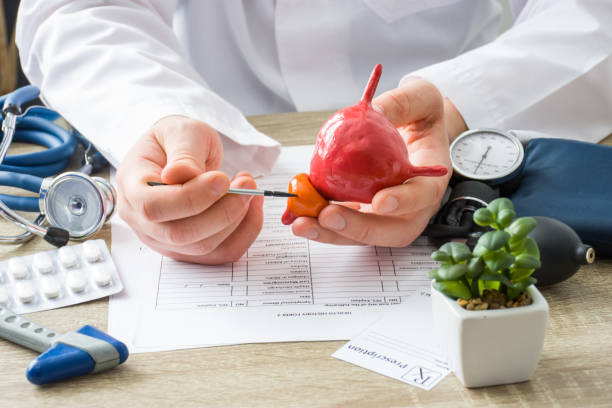
Benign prostatic hyperplasia (BPH) is an enlargement of the prostate. As the prostate gets bigger, it may constrict the urethra, causing lower urinary tract symptoms such as urinary frequency, dribbling at the end of urinating, inability to urinate, incomplete emptying of bladder, incontinence, difficulty starting urination or straining to urinate or weak urine stream.
For some patients, these symptoms interfere with sleep, further reducing their quality of life. More than 50% of men in their 60s and as many as 90% aged 70-89 years have some urinary symptoms because of BPH.
Side Effects of a Large Prostate
- Inability to urinate
- Inability to fully empty your bladder
- Dribbling after urination
- Incontinence
- Pain with urination
- Straining with urination
- Delayed start when urinating
- Weak or slow urine stream
- Frequent urges to urinate at night (2 or more times)
What is Prostate Artery Embolization?
Prostate artery embolization, or PAE, is a cutting-edge procedure performed to help improve urinary symptoms caused by an enlarged prostate without the risk of sexual side effects. PAE is a minimally invasive procedure that is done in an outpatient setting. Medication is given through an IV in your arm to help you relax or put you in a twilight sedation throughout the procedure.
An angiogram will be performed and that is when an Interventional CardioVascular Specialist, Interventional Radiologist or Vascular Surgeon puts a small tube called a catheter into your artery. A contrast is injected into your artery in order to visualize the blood flow with the use of x-ray at the same time. The catheter is then moved to the prostate artery. Tiny embolization particles are placed into the tiny vessels of the prostate. The particles block the blood flow to the areas of the prostate that are most affected by BPH, resulting in death, or necrosis, of isolated areas.
Because it is impossible to block all of the blood flow to the prostate, it does not die completely. These areas of necrosis cause the prostate to initially be softer, alleviating some of the pressure that is causing blockage of the urine. Over several months, the body’s immune system reabsorbs the dead tissue and replaces it with scar. This scar tissue slowly contracts resulting in shrinkage of the prostate. Over a six- month period, the prostate will shrink by 20-40%, resulting in improved and less frequent urination.
Recovery Time
Recovery from an angioplasty is only a few short hours at Vascular Institute. You will be monitored closely and then able to go home. It will be recommended to rest the remainder of the first day. You will have some lifting and activity restrictions for up to 5 days.
During this recovery period, you may experience mild soreness, bruising and/or discoloration of the skin where the artery was punctured and the catheter was inserted. You will be sent home with discharge instructions after the procedure on specific instructions to follow.
Who is a Good Candidate for PAE?
- Men between the age of 50 and 85
- Have lower urinary tract symptoms, such as difficulty urinating, frequent urination or urinary retention requiring catheterization caused by an enlarged prostate
- Have tried but not responded to six months of medication therapy or have significant side effects from medication such as dizziness, fatigue, or sexual dysfunction
- Do not want to undergo invasive surgical procedures or are not candidates for surgery
- Have evidence of decreased urine flow or acute urinary retention
Where to go for Prostate Artery Embolization?
Having an enlarged prostate is not only uncomfortable, it can also can cause you to have a decreased quality of life. Most men do not want to seek treatment or find it embarrassing to talk about their prostate.
At Vascular Institute, we want to help you get your life back. Prostate artery embolization has a high rate of success, with over 90% of men experiencing relief in the first year. Unlike other treatments that may have unwanted sexual side effects, PAE does not affect sexual performance.
